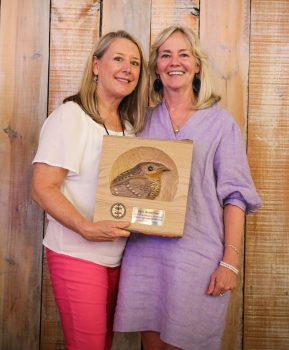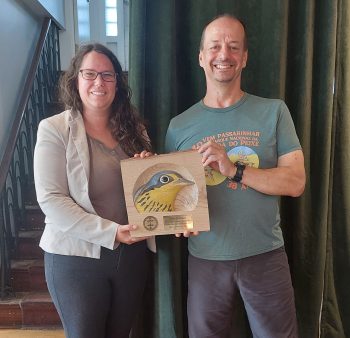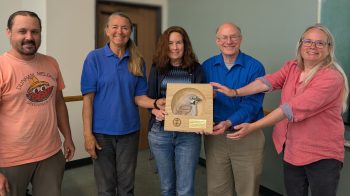Partners in Flight (PIF) Awards recognize exceptional contributions to the field of landbird conservation in the Americas in the categories of Leadership, Investigations, Public Awareness, Stewardship, and the David N. Pashley Lifetime Achievement Award.
Leadership
Honors an individual or group that demonstrates outstanding guidance and direction that contributes, or has contributed to, advancing PIF conservation efforts.
SARA SCHWEITZER
SARA SCHWEITZER, Assistant Chief, Division of Wildlife Management Wildlife Diversity Program, North Carolina Wildlife Resources Commission, has been selected to receive an Individual Partners in Flight Leadership Award for leading state engagement for bird conservation and implementation of Partners in Flight (PIF) priorities. Beyond involvement in Atlantic Flyway committees and shorebird and waterbird initiatives, Sara long served as Chair of the Association of Fish and Wildlife Agencies (AFWA) PIF/Shorebird/Waterbird Working Group. She embraced PIF’s collaborative approach and was instrumental in communicating and promoting PIF priorities to state directors and ensuring PIF priorities were incorporated into revised State Wildlife Action Plans. Through her innovative and effective leadership, she worked to address concerns about human activities affecting bird mortality, initiating an AFWA working group that led to the AFWA Resolution on Feral and Free-Ranging Cats. She also formed the Grassland Work Group, which led to an AFWA Resolution to support grassland bird conservation. In response to Rosenberg et al. 2019, Sara directed the effort for an AFWA resolution, Promoting a Coordinated Response to the Pervasive Loss of North American Birds. Recognizing the need for added capacity to produce multi-state landbird conservation products, she led the effort for PIF to develop “Conservation Delivery Specialists” which resulted in an Atlantic Flyway position. Sara is truly an unyielding advocate for bird conservation and a model leader to work with.


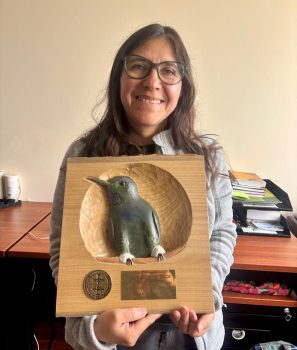
TATIANA SANTANDER GARCÍA
TATIANA SANTANDER GARCÍA, Project Coordinator/Coordinadora de Proyectos, Aves y Conservación with BirdLife in Ecuador, has been selected to receive an Individual Partners in Flight Leadership Award for her 25 years of leadership and commitment to the protection of Ecuador’s birds. Tatiana’s exceptional contributions have included publishing critical information, leading participatory conservation processes, building capacities among the inhabitants of the rural territories critical for biodiversity, and training the next generation of ornithologists. In 2006, Tatiana co-published the Areas of Importance for the Conservation of Birds (IBAs), the first in South America, which were officially recognized by the Ministry of Environment of Ecuador as priority areas for biodiversity management. Tatiana then led the process of creating Local Support Groups in four IBAs, building capacities among the inhabitants of these IBAs to implement conservation, habitat restoration, and sustainable production initiatives identified by Tatiana and others in the Investment Plan for the Conservation of the Ecuadorian Chocó Andes. Tatiana has also played a crucial role in the conservation of the endemic and endangered Black-breasted Puffleg hummingbird through research and monitoring, which led to the identification of new high-priority conservation areas, her ability to mobilize resources and coordinate actions which has been decisive in initiating restoration of its sustaining ecosystems, particularly through the Raíces Nativas women’s group; and through engaging local communities to create awareness and training professionals.
Investigations
Honors an individual or group that conducts outstanding research and/or contributes scientific data and interpretations that improve our understanding of avian ecology, habitat management, or other scientific factors important to the PIF initiative.


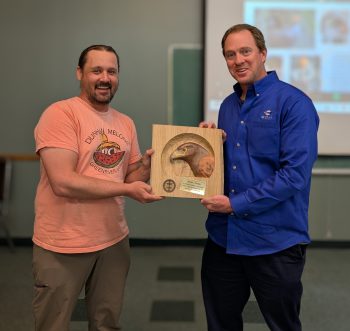
JAMES DWYER
JAMES DWYER, Research Scientist with EDM International, Inc., has been selected to receive an Individual Partners in Flight Investigations Award for his novel and effective conservation strategies over two decades for mitigating avian electrocution and power line collisions. Starting with his research on electric shock injuries to Harris’s Hawks, James demonstrated that partnerships with utility industries would be a win-win through retrofitting power poles. Knowing the real issues facing raptor populations in the Western United States, in 2010, he took a position with EDM International as a Research Scientist, and in that role, he has contributed tremendously to the field of mitigating avian electrocutions and collisions across the western landscape, working with partners throughout the United States and in Central and South America, Europe, Asia, and South Africa. He has been a lead or coauthor in 81 peer-reviewed articles on the subject, including solutions related to addressing the issue at a landscape or global scale. James’ goal has always been to make pertinent information available to the U.S. Fish and Wildlife Service, electric utility companies, and the scientific community in order to make changes necessary to benefit bird populations. These peer-reviewed publications have become key for regulators to guide project planning, mitigation, and estimate electrocution or collision impacts on species. James is also constantly mentoring and encouraging professional growth in this field for young people.
Public Awareness
Honors an individual or group that contributes significantly to increasing the public’s awareness and appreciation for birds, their habitats, or the need for conservation.
TED CHESKEY
TED CHESKEY, Naturalist Director/Directeur naturaliste with Nature Canada, has been selected to receive an Individual Partners in Flight Public Awareness Award for mainstreaming bird conservation in Canadian municipalities and working with Indigenous communities. He has successfully invited Canada’s Indigenous peoples to be part of this effort, giving them a role befitting their knowledge and experience and supporting their efforts to identify and protect migratory bird populations and habitats in their homelands. At Nature Canada, Ted initiated significant partnerships with Indigenous groups and organizations, some of which have lasted decades. He worked with the Moose Cree First Nation to help inform community involvement and decision-making around land use planning and management to protect this area under Ontario law. This included a focus on Canada Warbler, for which he co-led the development of the International Canada Warbler Conservation Initiative and subsequent expert workshops in Ottawa and Bogota, Colombia. He also collaborated with the Six Nations of the Grand River (Ontario) to protect aerial insectivores, and he helped put together funding proposals, an inventory of historical bird observations, and conduct traditional ecological knowledge interviews. Ted was the driving force behind Bird Friendly Cities in Canada, certifying 30 cities and towns and incorporating a requirement that applicants must invite the local First Nation to participate. He has done a lot of listening and built relationships of trust.
Stewardship
Honors an individual or group that contributes significantly to the management, conservation, or restoration of landbird habitat or priority species.
SAN CLEMENTE BELL’S SPARROW MANAGEMENT AND RECOVERY TEAM
The SAN CLEMENTE BELL’S SPARROW MANAGEMENT AND RECOVERY TEAM, which includes Melissa Booker and Kimberly O’Connor (U.S. Navy), Sue Meiman and Dave Garcelon (Institute for Wildlife Studies), and Sandy Vissman (U.S. Fish and Wildlife Service; USFWS), has been selected to receive a Group Partners in Flight Stewardship Award for their contributions to the management, recovery, and delisting of the San Clemente Bell’s Sparrow. Prior to the Navy’s ownership of San Clemente Island, this endemic species faced severe declines due to habitat loss and unmanaged threats. Earlier eradication of feral ungulates led to significant recovery, but the sparrows were confined to historically monitored breeding areas. Island-wide and telemetry surveys were initiated, which confirmed breeding in areas previously considered unsuitable. This led to a redesign of population monitoring, an expert’s workshop, and a partnership with USGS to design a sampling method that monitored potential habitat. Cost-effective, volunteer-driven surveys were implemented to assess presence and track reproductive success, along with ongoing habitat sampling. A management plan was developed, and threats from non-native predators, invasive plants, and fire risk were targeted. These efforts resulted in breeding-season estimates five times higher than the previous estimate and a significantly expanded geographic distribution – a finding that formed the basis of a Species Status Assessment that ultimately supported delisting by the USFWS in 2023 and demonstrated the power of long-term collaboration.
See more 2024 PIF Awards content in our Conservation Resource Library:


